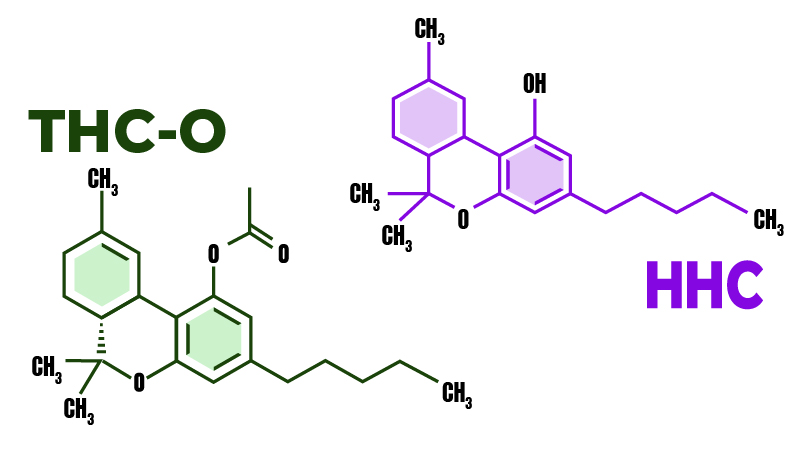This article offers a detailed breakdown of the differences between THC-O and HHC. Here we give insight into the chemical composition, potential benefits and risks, and the legal status of both cannabinoids. We also give recommendations on where to safely buy THC-O and HHC products.
As the hemp market is booming thanks to the discoveries of novel psychoactive cannabinoids, you may have seen some unusual names containing your favorite acronym — THC.
Delta-8, delta-10, THC-O, and HHC are different versions of the THC molecule.
They have a similar molecular structure to delta-9 THC, but subtle differences in their molecular bonding make them interact differently with cannabinoid receptors.
While delta-8 and delta-9 THC are past their prime attention time, new compounds are entering the cannabis scene — THC-O and HHC.
We’ll look at the differences between THC-O and HHC, compare their potency, health benefits, safety profiles, and product types.
Read on to meet the new members of the THC family.
THC-O vs. HHC (Summary)
- THC-O is a semi-synthetic cannabinoid derived from hemp. It’s about 300% stronger than delta-9 THC.
- HHC is the hydrogenated form of THC, containing around 80% of its potency and boasting a longer shelf-life thanks to its more stable structure.
- HHC is considered natural, while THC-O is made using a conversion process from CBD to delta-9 THC and adding acetic anhydride to its structure.
- THC-O produces stronger effects than HHC. They’re centered around the mental side and can lead to a spiritual experience on the verge of hallucinations in high doses.
- HHC’s effects are more focused on the body and come with a lower risk of anxiety and paranoia.
- THC-O and HHC are most commonly used in their concentrated form, e.g., dabs, oils, and vape carts.
- Both compounds are theoretically legal at the federal level as long as the final product contains 0.3% or less delta-9 THC
Cannabis – The Plant of Hundreds of Compounds
Cannabis has long been used for its psychoactive properties in medicine, spiritual rituals, and by recreational users. It was domesticated around 12,000 years ago in China, making it one of the oldest crops used by humans.
The ratio between different cannabinoids affects the therapeutic profile and potential uses of a specific strain and product. People use cannabis to relieve anxiety, stress, pain, tension, migraines, inflammation, appetite disorders, insomnia, and more.
However, until recently, consumers have only been aware of one THC – delta-9.
Two years ago, we could witness a major breakthrough in extraction methods that allowed hemp manufacturers to extract usable quantities of other isomers of THC from hemp.
We’ve already had delta-7, delta-8, and delta-10 THC.
2022 was the year that put two other THCs in the spotlight — THC-O and HHC.
Although similar on the surface, these compounds offer slightly different effects and fit different types of users.
Let’s start with THC-O.
What is THC-O?
There are different extraction methods for various cannabinoids. Some of them, such as delta-9 THC, CBD, or CBG, naturally occur in the plant, and manufacturers can easily extract their large quantities.
Other cannabinoids are more difficult to obtain and require a special conversion process from one of the major compounds in hemp.
That’s how THC-O is produced.
THC-O acetate is an extremely potent analog of delta-9 THC. Its potency has been measured at around 300% higher, indicating intense psychoactive effects.
The potency of THC-O derives from its original purpose. The U.S. military discovered the compound in 1940, experimenting with natural, non-lethal drugs to incapacitate enemies.
Despite its synthetic nature, THC-O has a similar structure to delta-9 THC.
What is HHC?
HHC stands for hexahydrocannabinol. It’s a hydrogenated version of THC.
If hydrogenation creates associations with margarine in your mind, you’re on the right track.
The manufacturing process of HHC follows similar steps to how hydrogenated fats are made — by adding a hydrogen atom to delta-9 THC.
THC-O vs. HHC: What’s the Difference?

There’s a lot of confusion surrounding the effects of THC-O and HHC, their potency, and potential benefits.
Both compounds are variants of THC, so they produce similar effects at the core. However, both THC-O and HHC have their own unique properties.
Let’s start by evaluating the potency of each.
What’s the Potency of THC-O Like?
As mentioned earlier, THC-O is 3 times stronger than delta-9 THC. If you easily get high from smoking marijuana, you should take extreme caution when trying THC-O.
Start with a smaller dose and gradually work your way up to the point where the psychoactive effects are satisfying but not overwhelming.
If you go overboard with THC-O, you may experience elevated anxiety, paranoia, racing heart, cold sweats, confusion, dizziness, problems with coordination, and short-term memory impairment.
They’re similar to the side effects of delta-9, but they can get much worse due to higher potency.
Long story short, THC-O puts the psychoactive effects of marijuana to shame. If you tolerate high doses of THC, you’re up for real fun with THC-O products — full of euforia, munchies, chill, and stirred the imagination.
The effects of THC-O kick in with a slight delay, so make sure to wait at least 30 minutes before you take another dose. Once the effects are at their peak, you can evaluate how you feel and decide if you’re good with what you have or if there’s room for another portion.
What About HHC Potency?
The effects of HHC are almost identical to those induced by delta-9 THC. However, unlike THC-O, HHC is less potent than delta-9. It carries around 80% of delta-9’s potency.
Another difference between THC-O and HHC is how they affect the body and brain. THC-O is highly psychoactive and can stimulate the mind; meanwhile, THC gives you more of a physical buzz that leaves you mellow and relaxed — but not stoned. From a psychological perspective, the effects of HHC are more uplifting and motivating, especially in moderate doses.
Other Differences Between THC-O and HHC
Now that we’ve covered the major difference between THC-O and HHC let’s cover the less talked-about details.
Source
Both cannabinoids come from cannabis plants. They can be extracted from hemp or marijuana.
However, cannabis doesn’t naturally synthesize THC-O. Instead, manufacturers have to convert CBD to THC and then add acetic anhydride to change the structure of the final compound.
HHC is made by adding hydrogen atoms to THC, which is a process similar to how margarine was invented.
Type of Effects
THC-O creates an intensely psychoactive experience. Even moderate doses are stronger than marijuana, so if you’ve never tried psychoactive cannabinoids before, start with a very low dose to avoid getting too high.
The potency of THC-O makes it a treat for seasoned cannabis users. Those who have taken high doses of THC-O report feeling on the verge of hallucinations, describing the experience as deeply spiritual.
HHC, when compared with delta-9 THC, is lighter in comparison. The high goes smoothly throughout the body and mind, leaving you calm and motivated. Larger doses induce euphoria and provide greater body load, making HHC products a decent pick for evenings or lazy days.
Manufacturing Process
THC-O is a synthetic analog of delta-9 THC, meaning it uses a complicated extraction process.
Here’s what it looks like in a nutshell:
- You extract CBD from the hemp plant, ensuring your strain contains less than 0.3%. Once you have a crude full-spectrum extract, you convert CBD to delta 8 THC.
- Then you add acetic anhydride to an ester of THC.
- Voila, you’ve got THC-O acetate.
The final product has no odor or flavor — and a thick texture. It carries high concentrations of THC-O, which can be diluted with a carrier oil to create a tincture or prepare edibles. Some THC-O distillates are thinned down with terpenes to create extra synergy.
HHC is easier to produce. It requires a lab, though, despite being a natural substance. Back then, THC was hydrogenated with the use of acids. The novel process, however, triggers hydrogenation by using catalysts like nickel, rhodium, palladium, etc.
Shelf Life
Another difference between THC-O and HHC lies in how long they’re good for.
THC-O distillate has a shelf-life of 6 months, which is shorter than delta-9 products.
Marijuana extracts usually last for 1 year until they lose a fraction of their potency.
HHC is the winner in this clash. It has a more stable chemical structure; pure HHC products can last for 2 years or more if stored properly.
Is THC-O Legal?

The 2018 Farm Bill legalized hemp and its derivatives, provided that they contain no more than 0.3% of THC.
But back then, nobody assumed that technology would overcome the law so fast and manufacturers would be able to extract different isomers of THC from hemp, and they won’t be classified as delta-9, as outlined in the Farm Bill.
Every hemp-derived product with less than 0.3% delta-9 THC is federally legal, including delta-8, delta-10, HHC, and THC-O extracts.
So far, THC-O is legal in 38 states; the other 12 banned its sales or introduced changes in the law that put the 0.3% limit on all forms of THC.
Is HHC Legal?
HHC is also legal at the federal level, with most states accepting HHC products.
HHC must meet two requirements to be considered legal:
- It must be extracted from hemp
- The delta-9 THC content in the final product must not exceed 0.3%
Check your local laws to learn about the legality of HHC products in your state.
How to Safely Buy THC-O and HHC Products
The market of hemp-derived cannabinoids is largely unregulated. That means there are no official requirements for organic farming or lab-testing. It’s up to a manufacturer’s goodwill.
Most THC-O and HHC products sold at traditional head shops and vape stores are uncertified, so there’s no way to verify their potency and chemical makeup. You may just as well be buying a contaminated product infused with dangerous additives or one containing no THC-O or HHC.
Local stores are also pumping the prices of THC-O and HHC-infused products because of the high demand.
The best way to safely buy THC-O and HHC is to find a reputable online retailer. Online stores are usually run by professionals whose entire business revolves around hemp. If you buy directly from the manufacturer, you can read them like an open book, ask for lab reports, compare prices with different brands, and check customer reviews on third-party websites.
Shopping for hemp-derived products is also more convenient. You can browse through hundreds of options and choose from different formulas, potencies, formats, potencies, and flavors to adjust the experience to your expectations.
Not to mention that online stores can bypass the middleman and offer better price deals for their products. On top of that, you can join for a subscription, use a reward program, or special coupon codes to save even more money.
THC-O vs. HHC: Key Takeaways
THC-O and HHC are analogs of the standard delta-9 THC. Thanks to the loophole created by the 2018 Farm Bill, they’re federally legal, which garnered the attention of cannabis users living in states without recreational marijuana laws.
The main difference between THC-O and HHC is their potency. THC-O is 300% stronger than delta-9, while HHC is around 80% as potent as its precursor.
The effects of THC-O are more psychedelic and can lead to vivid audiovisual experiences, as well as deep spiritual introspection. HHC is more of a recreational cannabinoid, delivering smooth cerebral effects accompanied by physical relaxation and a motivation boost.
If you’re up for trying HHC and THC-O products, make sure you get them from a reputable source that provides up-to-date certificates of analysis from a third-party laboratory regarding the product’s potency and purity.